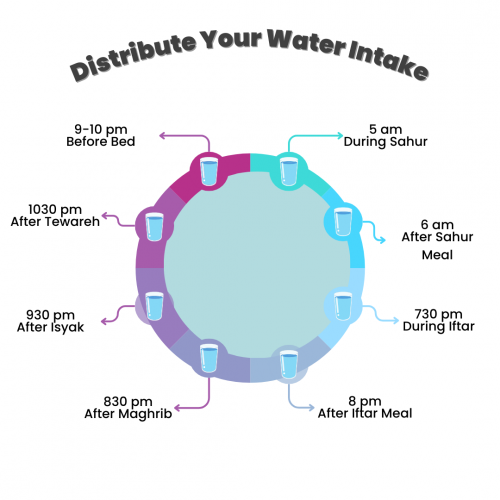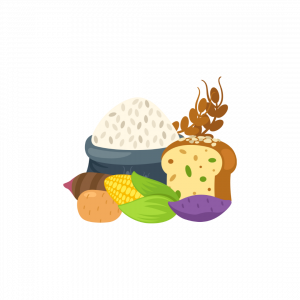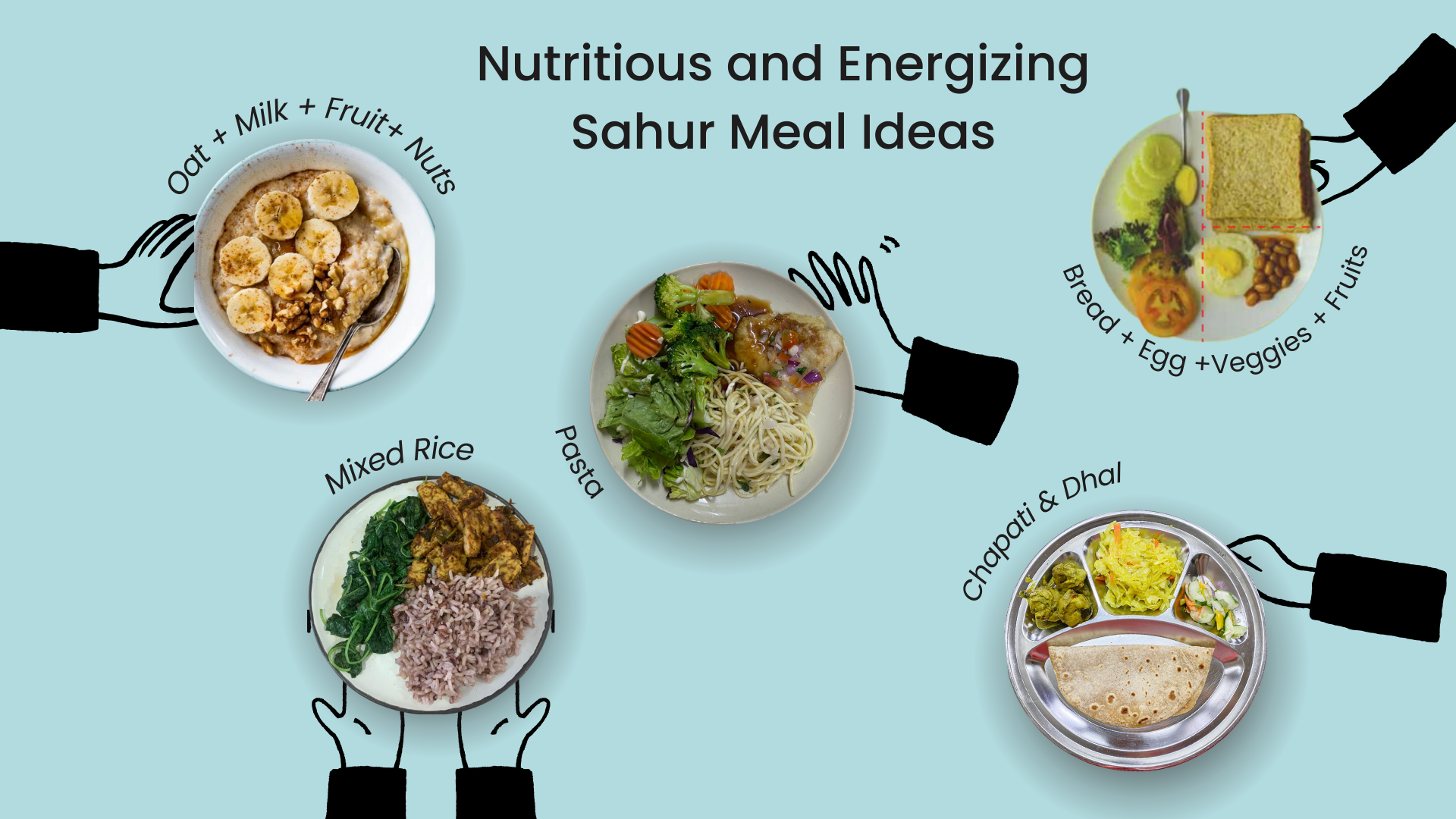
Ramadan, the holy month observed by millions of Muslims worldwide, is a time of spiritual reflection, self-discipline, and increased devotion. One of the essential practices during this month is Sahur, the pre-dawn meal before the daily fast begins at sunrise. Sahur provides a critical source of sustained energy that helps individuals endure the long hours of fasting. Let’s explore the foods to include and those to avoid for a healthier Sahur.
Foods to Include:
Water
 Start your sahur with a glass of water to rehydrate your body after the night’s fasting. Proper hydration is essential to kickstart your metabolism and prepare your body for the day ahead. At least eight glasses of water during the non-fasting period to meet your hydration needs. Additionally, incorporating hydrating foods with high water content, such as watermelon and cucumber, into your sahur can contribute to your overall fluid intake. Here is a guideline to help distribute your water intake:
Start your sahur with a glass of water to rehydrate your body after the night’s fasting. Proper hydration is essential to kickstart your metabolism and prepare your body for the day ahead. At least eight glasses of water during the non-fasting period to meet your hydration needs. Additionally, incorporating hydrating foods with high water content, such as watermelon and cucumber, into your sahur can contribute to your overall fluid intake. Here is a guideline to help distribute your water intake:

Fruits and Vegetables
 Including colorful fruits and veggies in your sahur ensures a nutrient-rich start. The vibrant colors signal a variety of vitamins and minerals, supporting vital bodily functions. Additionally, it helps prevent constipation by aiding digestion and promoting a healthy gut microbiome. An excellent example of a fruit for sahur is dates, offering a quick energy boost with natural sugars, along with potassium, magnesium, and B vitamins to replenish energy levels throughout the day.
Including colorful fruits and veggies in your sahur ensures a nutrient-rich start. The vibrant colors signal a variety of vitamins and minerals, supporting vital bodily functions. Additionally, it helps prevent constipation by aiding digestion and promoting a healthy gut microbiome. An excellent example of a fruit for sahur is dates, offering a quick energy boost with natural sugars, along with potassium, magnesium, and B vitamins to replenish energy levels throughout the day.
Complex Carbohydrates
 Whole grains, such as wholemeal bread, barley, brown rice and oat, are excellent choices due to their rich fiber content and complex carbohydrate composition. Fiber not only aids in digestion but also promotes a gradual rise in blood sugar levels, preventing the abrupt spikes and crashes associated with simple carbohydrates. This makes them an ideal addition to your sahur, ensuring that you have the stamina to endure the fasting hours.
Whole grains, such as wholemeal bread, barley, brown rice and oat, are excellent choices due to their rich fiber content and complex carbohydrate composition. Fiber not only aids in digestion but also promotes a gradual rise in blood sugar levels, preventing the abrupt spikes and crashes associated with simple carbohydrates. This makes them an ideal addition to your sahur, ensuring that you have the stamina to endure the fasting hours.
Protein Sources
 Pairing carbohydrates with protein-rich foods in your sahur creates a more satisfying and energizing meal. The satiating effects of protein help regulate appetite and maintain a steady release of energy, beneficial during fasting hours to prevent hunger and energy fluctuations. Options like eggs, yogurt, lean meat, or plant-based sources such as beans, tempeh and tofu provide essential nutrients beyond protein.
Pairing carbohydrates with protein-rich foods in your sahur creates a more satisfying and energizing meal. The satiating effects of protein help regulate appetite and maintain a steady release of energy, beneficial during fasting hours to prevent hunger and energy fluctuations. Options like eggs, yogurt, lean meat, or plant-based sources such as beans, tempeh and tofu provide essential nutrients beyond protein.
Foods to Avoid:
Salty Foods
 Excessive salt intake during sahur should be minimized to prevent dehydration. High salt consumption disrupts fluid balance and triggers water conservation in the body, leading to increased urine production. Moderating salt intake is essential to maintain a healthy fluid balance and prevent discomfort during fasting. Common salty foods to limit include processed snacks, salty sauces, instant noodles and pickled items.
Excessive salt intake during sahur should be minimized to prevent dehydration. High salt consumption disrupts fluid balance and triggers water conservation in the body, leading to increased urine production. Moderating salt intake is essential to maintain a healthy fluid balance and prevent discomfort during fasting. Common salty foods to limit include processed snacks, salty sauces, instant noodles and pickled items.
Sugary Foods
 Sugary foods can cause a rapid spike in blood sugar levels, providing a quick but short-lived energy boost. However, this immediate surge is often followed by a significant drop in blood sugar levels, creating a crash effect. Consequently, increased hunger and fatigue may manifest later in the day during the fasting period. The impact of these blood sugar fluctuations can cause irritability and disrupt our mood.
Sugary foods can cause a rapid spike in blood sugar levels, providing a quick but short-lived energy boost. However, this immediate surge is often followed by a significant drop in blood sugar levels, creating a crash effect. Consequently, increased hunger and fatigue may manifest later in the day during the fasting period. The impact of these blood sugar fluctuations can cause irritability and disrupt our mood.
Highly Processed Foods
 Reduce highly processed foods like pre-packaged snacks, processed meat, and fast-food items for your sahur. These options are often loaded with additives, preservatives, and unhealthy fats, hindering effective digestion. High-fat options may cause delayed gastric emptying and an increase in gas production in the stomach, leading to discomfort and bloating during the fasting period.
Reduce highly processed foods like pre-packaged snacks, processed meat, and fast-food items for your sahur. These options are often loaded with additives, preservatives, and unhealthy fats, hindering effective digestion. High-fat options may cause delayed gastric emptying and an increase in gas production in the stomach, leading to discomfort and bloating during the fasting period.
Caffeine and Carbonated Drinks:
 Caffeine intake during sahur may not be advisable as it can lead to dehydration due to its diuretic effects, increasing urine production. However, breaking your fast with a cup of caffeinated drink is also not a good idea since caffeine on an empty stomach can stimulate gastric acid release. The best time to enjoy coffee during Ramadan is between iftar and moreh. It is recommended to avoid consuming it an hour before sleep to ensure ease in waking up for sahur. Caffeinated drinks included are coffee, tea, carbonated drinks, and energy drinks.
Caffeine intake during sahur may not be advisable as it can lead to dehydration due to its diuretic effects, increasing urine production. However, breaking your fast with a cup of caffeinated drink is also not a good idea since caffeine on an empty stomach can stimulate gastric acid release. The best time to enjoy coffee during Ramadan is between iftar and moreh. It is recommended to avoid consuming it an hour before sleep to ensure ease in waking up for sahur. Caffeinated drinks included are coffee, tea, carbonated drinks, and energy drinks.

As you prepare for sahur during Ramadan, embrace these nutritious and energizing ideas that not only nourish your body but also delight your senses. Let the images above inspire you to create colorful, flavorful, and wholesome meals, ensuring you start each day of fasting on a nourishing note.
Balanced and nutritious Sahur meal is essential for sustaining energy levels throughout the day of fasting. Making informed and balanced choices for the pre-dawn meal ensures that we can fulfill our religious obligations while maintaining optimal nutrition. By recognizing the importance of Sahur, we can make the most of this holy month and prioritize our health throughout the fasting period.
Raihana, Dietitian













